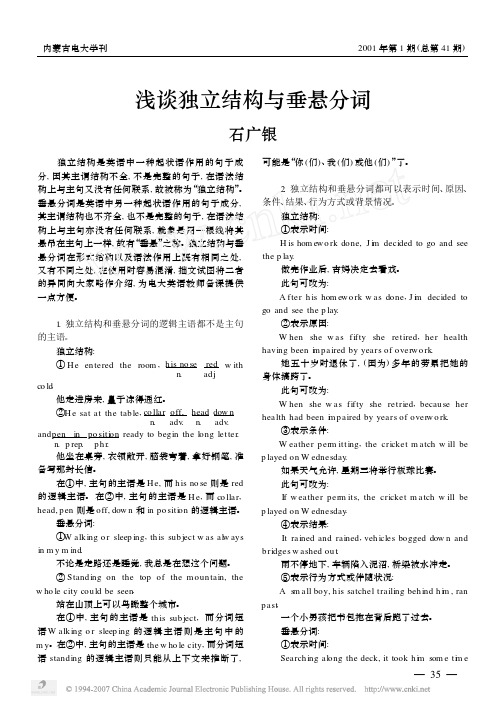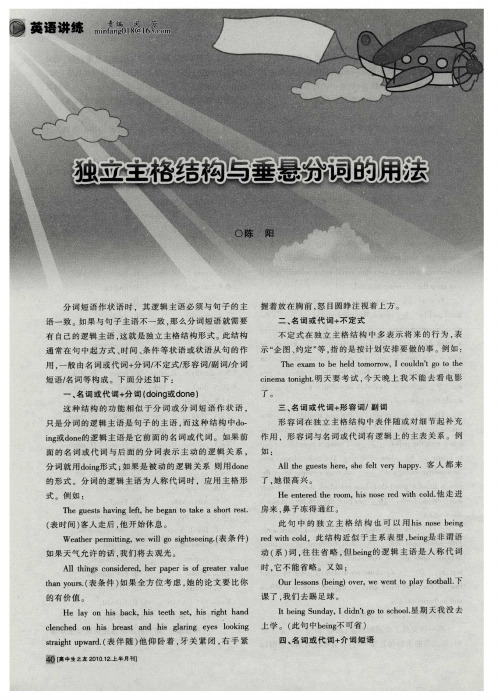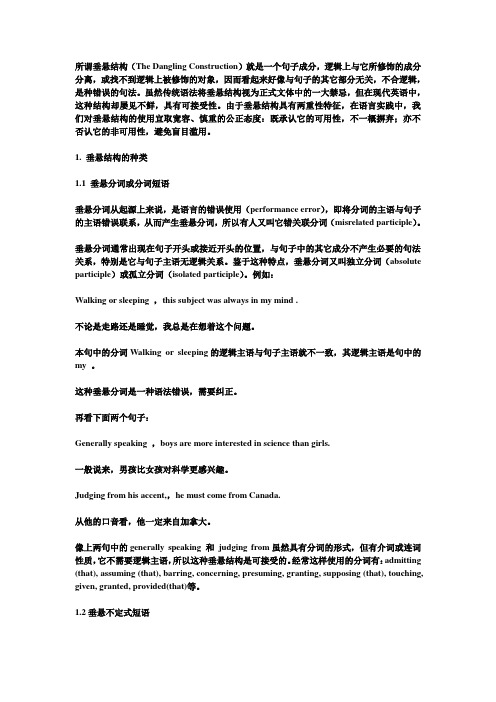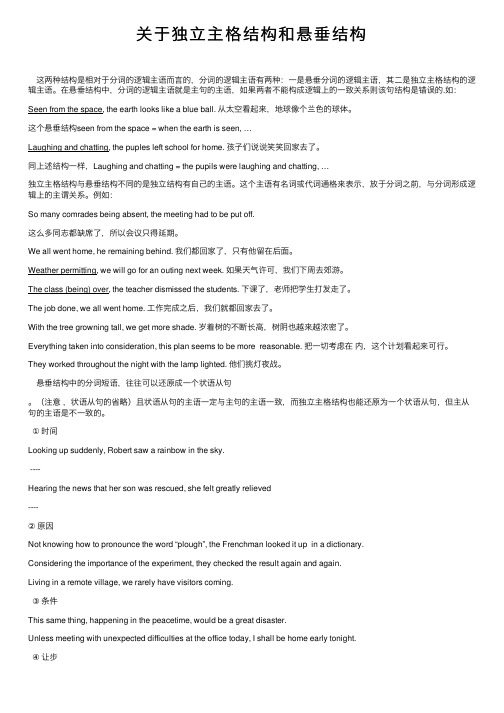垂悬分词和独立主格结构
浅谈独立结构与垂悬分词

w ho le city cou ld be seen. 站在山顶上可以鸟瞰整个城市。 在①中, 主句的主语是 th is sub ject, 而分词短
T he o ld m an sa t dow n, h is face p a lew ith p a in n. ad j.
and traces of tea rs still on h is cheek s.
老头坐了下来, 痛苦得脸色发白, 两颊上还带有
泪痕。
(3) 名词 (代词) + 副词
T he show er over, w e con tinued the m a rch.
语 W alk ing o r sleep ing 的逻辑主语则 是 主 句 中 的 m y。在②中, 主句的主语是 the w ho le city, 而分词短 语 standing 的逻辑主语则只能从上下文来推断了,
可能是“你 (们)、我 (们) 或他 (们) ”了。
2. 独立结构和垂悬分词都可以表示时间、原因、 条件、结果、行为方式或背景情况。
待着有人来接应。
5. 独立结构可以改为由 w ith 或 w ithou t 引导的 介词词组, 或者扩展成一个带有限定动词的从句, 而 垂悬分词一般不能, 即使勉强改过来的, 句子也显得 十分别扭。
独立结构: ① N obody no ticing, I slipp ed th rough the w indow. 没人注意的时候, 我爬窗逃走了。 可改为:W ithou t anybody no ticing, I slipp ed th r ough the w indow. ②H e p u t on h is sock s w rong side ou t. 他把袜子穿反了。 可 改 为: H e p u t on h is sock s w ith the w rong side ou t. ③ T he la st bu s having gone, w e had to w a lk hom e. 最后一道班车已经开走, 我们只好走路回家了。 可 改 为: B ecau se the la st bu s gone, w e had to w a lk hom e. 句④Sp ring com ing on, trees tu rn g reen. 春天到了, 树木就会变绿。 可 改 为: W hen sp ring com es on, trees tu rn g reen. 垂悬分词:
独立主格结构与垂悬分词的用法

O r esn b ig oe. ew n t pa o a . u sos( n ) v rw eto ly ot l下 l e f b1
课 了 , 们去踢足球。 我
I b igS n a . int ot s h o. t e u d y I d ’g c o 1 n d o 星期 天 我 没 去 上学 。 ( 句 中b ig 可 省 ) 此 e 不 n
四 、 词 或 代 词+介 词 短 语 名
s a h p ad( 伴 随 ) 仰 卧 着 , 关 紧 闭 , 手 紧 t i t w r.表 rg u 他 牙 右
桶 【 高中生之友21 1. - 刊】 00 2 ,  ̄Pq
英 语讲 练 m 青g 81 iao @6 nn 1 芳 f 闵 3 编
h d bi 是 n Wete emiig w i os hse g( 条 件 ) rdw t c l 。此 结 构 近似 于 主 系 表 型 , e g 非 谓 语 a rpr tn, ewlg i t i . h t l g en 表 e i o
如果 天 气 允 许 的话 , 我们 将 去 观 光 。
企 约 等 指 例 通 常 在 句 中 起 方 式 、 间 、 件 等 状 语 或 状 语 从 句 的 作 示 “ 图 、 定 ” , 的 是 按 计 划 安排 要 做 的事 。 如 : 时 条 用 . 般 由名 词 或 代 词 + 词 , 定式 , 容 词/ 词/ 词 一 分 不 形 副 介 短语 / 词 等 构 成 。 下 面 分 述 如下 : 名
Al t fg o sd rd e a e s o r a e au l h a s c n ie e ,h r p p r i fg e t r v l e i
垂悬结构

所谓垂悬结构(The Dangling Construction)就是一个句子成分,逻辑上与它所修饰的成分分离,或找不到逻辑上被修饰的对象,因而看起来好像与句子的其它部分无关,不合逻辑,是种错误的句法。
虽然传统语法将垂悬结构视为正式文体中的一大禁忌,但在现代英语中,这种结构却屡见不鲜,具有可接受性。
由于垂悬结构具有两重性特征,在语言实践中,我们对垂悬结构的使用宜取宽容、慎重的公正态度:既承认它的可用性,不一概摒弃;亦不否认它的非可用性,避免盲目滥用。
1. 垂悬结构的种类1.1 垂悬分词或分词短语垂悬分词从起源上来说,是语言的错误使用(performance error),即将分词的主语与句子的主语错误联系,从而产生垂悬分词,所以有人又叫它错关联分词(misrelated participle)。
垂悬分词通常出现在句子开头或接近开头的位置,与句子中的其它成分不产生必要的句法关系,特别是它与句子主语无逻辑关系。
鉴于这种特点,垂悬分词又叫独立分词(absolute participle)或孤立分词(isolated participle)。
例如:Walking or sleeping ,this subject was always in my mind .不论是走路还是睡觉,我总是在想着这个问题。
本句中的分词Walking or sleeping的逻辑主语与句子主语就不一致,其逻辑主语是句中的my 。
这种垂悬分词是一种语法错误,需要纠正。
再看下面两个句子:Generally speaking ,boys are more interested in science than girls.一般说来,男孩比女孩对科学更感兴趣。
Judging from his accent,,he must come from Canada.从他的口音看,他一定来自加拿大。
像上两句中的generally speaking 和judging from虽然具有分词的形式,但有介词或连词性质,它不需要逻辑主语,所以这种垂悬结构是可接受的。
关于独立主格结构和悬垂结构

关于独⽴主格结构和悬垂结构这两种结构是相对于分词的逻辑主语⽽⾔的,分词的逻辑主语有两种:⼀是悬垂分词的逻辑主语,其⼆是独⽴主格结构的逻辑主语。
在悬垂结构中,分词的逻辑主语就是主句的主语,如果两者不能构成逻辑上的⼀致关系则该句结构是错误的.如:Seen from the space, the earth looks like a blue ball. 从太空看起来,地球像个兰⾊的球体。
这个悬垂结构seen from the space = when the earth is seen, …Laughing and chatting, the puples left school for home. 孩⼦们说说笑笑回家去了。
同上述结构⼀样,Laughing and chatting = the pupils were laughing and chatting, …独⽴主格结构与悬垂结构不同的是独⽴结构有⾃⼰的主语。
这个主语有名词或代词通格来表⽰,放于分词之前,与分词形成逻辑上的主谓关系。
例如:So many comrades being absent, the meeting had to be put off.这么多同志都缺席了,所以会议只得延期。
We all went home, he remaining behind. 我们都回家了,只有他留在后⾯。
Weather permitting, we will go for an outing next week. 如果天⽓许可,我们下周去郊游。
The class (being) over, the teacher dismissed the students. 下课了,⽼师把学⽣打发⾛了。
The job done, we all went home. ⼯作完成之后,我们就都回家去了。
With the tree growning tall, we get more shade. 岁着树的不断长⾼,树阴也越来越浓密了。
分词作状语与独立主格结构(精华主讲)

Having been discussed several times, the decision was finally made. 进行了几次讨论后,终于做出了决定。
小练习:用所给动词的正确形式填空
5. 让步状语 Beaten by the police and sent to jail, Gandi created the principle of nonviolent resistance. 尽管受警察的殴打,被投入监狱,甘地却首创了非 暴力抵抗的原则。 Defeated again, he didn’t lose heart.
注意:现在分词和过去分词的特别之处
6.独立成份(插入语) Given good weather, our ship will reach Shanghai on Monday evening.
假如天气好,我们的船将于星期一晚上到达上海。 I’d come and see you in New York, given the chance.
5.让步状语:如:
Knowing all this, they made me pay for the damage.他们尽管了解这一切,还是要我们 赔偿损失。
6.独立成份(插入语)
Generally speaking, people all believe what he has said. 一般说来,人们都相信他所说的。
He said that the leaves of his flowers had turned yellow. He thought that it was due to a water shortage so he applied more water, only making things worse. 他说他的花的叶子变黄了.他想是缺水所致,于是多浇了水,结 果反而更遭。
解析四级英语写作中垂悬结构现象

解析四级英语写作中垂悬结构现象所谓垂悬结构是指非谓语动词短语和介词短语作状语时,其规律主语必需与主句的主语保持全都,否则构成一种语病,称为垂悬结构或非附着结构(unattached structure)。
这是高校四级英语写作中常见的错误现象之一,严峻影响对文章完整意思的精确理解。
一、四级英语写作中垂悬结构现象1、垂悬结构不定式。
To make friends,honesty is important.句中不定式短语To make friends 的主语应当是人,而主句的主语是honesty,两者不全都,构成了垂悬结构。
有三种改正方法:(1) 将不定式短语改成相应的状语从句,可更正为:If onewants to make friends,honesty is important. (2) 对主句做必要改动,使句子的主语与不定式短语的规律主语全都,可更正为:To make friends,one must be honest. (3) 给不定式短语加上自己的规律主语,可更正为:For one to make friends,honestyis important.2、垂悬结构分词。
Spreading to the left,he jumped downfrom the armchair. 依据此句话的意思,分词短语的隐含规律主语应当是the fire,而句子的主语是he,两者不全都,构成了垂悬结构。
有两种改正方法:(1)给分词短语带上一个自己的规律主语,使之成为一个独立主格结构,可更正为,The firespreading to the left,he jumped down from the armchair. (2)将分词短语改成相应的状语从句,可更正为:As/ When the firespread to the left,he jumped down from the armchair.3、垂悬结构动名词。
悬垂结构独力主格结构
悬垂结构独力主格结构悬垂结构 Dangling Element的定义一般在一个句子中,修饰语必须清楚地修饰句中某个词或短语,如果它不修饰句中的任何成分,而处于悬浮状态,这样的修饰语即为悬垂结构(Dangling Element)。
Climbing up the tower, the whole city came into our view.悬垂结构的理解分词短语在句子中作状语时,其逻辑主语(亦称隐含主语)通常应是整个句子的主语;如果不是,而且其本身也不带自己的主语(如在独立主格结构中),就被认为是一个语言失误。
这个分词就叫做“悬垂分词”(dangling participle)或“无依附分词”(unattached participle)。
例如:(1)Getting down from the bus,my ankle was sprained.(2)Driving to Chicago that night,a sudden thought struck me.由悬垂结构造成的错误(1)悬垂分词误: Being Sunday, they went for a picnic.正: It being Sunday, they went for a picnic.正: As it was Sunday, they went for a picnic.(2)悬垂不定式误:To swim properly, a course of instruction was necessary.正:To swim properly, one needs a course of instruction.(3)悬垂简式从句误:When a middle school student, his parents were very strict with him.正:When he was a middle school student, his parents were very strict with him.在学习语法过程中,请掌握技巧,然后理解消化.独力主格结构(the absolute structure)的定义由名词或代词加上分词或分词短语构成的一种独立结构,用于修饰整个句子,而不是一个词或词组。
分词作状语与独立主格结构(精华主讲)概论
区别三个概念: 分词作状语、垂悬结构、独立主格结构
主要内容 一、分词作状语、 二、垂悬(分词)结构 三、独立主格结构 四、With作复合结构
一、分词做状语
▪ 分词(包括过去分词和现在分词)做状语可修饰 整个句子,表示动作发生的时间,原因,条件, 结果,让步或伴随情况。其逻辑主语必须是句子 的主语,分词做状语一般相当于相应的状语从句 或并列句,在句子中有广泛用途。如:
3. 条件状语(相当于条件状语从句)如: Seen in this aspect, the matter isn’t as serious as people generally suppose. 如果从这个角度看,问题并不 像人们一般预料的那样`严重。 Grown in rich soil, these seeds can grow fast. 如果种在 肥沃的土壤里,这些种子能长得很快。 Given better attention, the accident could have been avoided. 要是多加注意,那次事故就能避免了。 Watered more, these cabbages could have grown better. 如果多浇点水,这些大白菜还可以长的得更好。 Compared with you, we still have a long way to go. 和 你相比,我们还有很大的差距。
过去分词作状语的基本用法
▪ 过去分词作状语主要是说明谓语动作发生的背景或条件;表 示原因、时间、条件、让步、方式或伴随情况等。过去分词 可置于主句前,也可置于主句后,用逗号与主句隔开。
▪ 1. 原因状语 Choked by the heavy smoke, he could hardly breathe. 他被浓烟呛了,几乎不能呼吸了。 Caught in a heavy rain, he was all wet. 因为淋了一场大 雨,所以他全身湿透了。 Frightened by the noise in the night, the girl didn’t dare to sleep in her room. 受到夜晚响声的惊吓,那姑娘不敢睡 在她的房间。
垂悬结构和独立主格结构
垂悬结构和独立主格结构I.一般来讲,分词或分词短语在句子中充当状语时,其逻辑主语与句子主语一致如Opening the drawer he took out a revolver.(其中opening的逻辑主语是句子主语he)II.当分词的逻辑主语与句子的主语不一致时,则应将分词的逻辑主语补出来如George yawning,the conversation dropped.这种分词结构被称作独立主格结构(独立主格结构(Absolute Structure)是由名词或代词加上分词等构成的一种独立结构。
独立主格结构中的名词或代词与其后的分词等构成逻辑上的主谓关系。
这种结构的位置相当灵活,可置于主句前、主句末或主句中,常由逗号将其与主句分开。
需特别注意的是,独立主格结构与主句之间不能使用任何连接词)§独立主格结构基本构成形式【名词(代词)+现在分词(过去分词;形容词;副词;不定式;名词;介词短语)】,在句中一般作状语,表示时间、条件、原因、伴随状况等,还可以作定语1. 名词(代词)+现在分词There being no bus, we had to walk home.(原因)由于没有公共汽车,我们只好走回家。
2. 名词(代词)+过去分词The workers worked still harder, their living conditions greatly improved. (原因)由于工人们的生活条件大大提高,他们工作得更起劲了。
He was listening attentively in class, his eyes fixed on the blackboard.(伴随状况)他上课专心听讲,眼睛紧盯着黑板。
3. 名词(代词)+不定式在“名词/代词+动词不定式”结构中,动词不定式和它前面的名词或代词如果存在着逻辑上的主谓关系,动词不定式则用主动的形式;如果是动宾关系,则用被动形式。
专四练习之语法2(非谓语动词,独立结构、悬垂结构)
2. it is a./n. +doing no good/no use/such a pity/ a waste of time /not an easy task good/better/foolish/useful/useless/difficult/po ssible It is +a./n.+ to do easy/difficult /right/ wrong/ important / clever/ foolish/ polite/ impolite/ pity/ honor/ shame/ odd
3) +doing, +to do 都可以的动词,一般无区别 Attempt, begin, can’t bear, deserve, continue, dread, hate, intend, like, loathe, love, need, neglect, omit, plan, prefer, require, start等, (P246章) 如上述动词为进行体,后则接不定式。 I’m starting to work/ it’s beginning to rain. 上述动词中need/want/require/deserve doing 表示被动。
3.当不定式和分词有自己的主语,构成 不定式和分词的独立结构时,不定式的 独立结构通常在句中作状语表示伴随, 分词独立结构在句中作状语,表示伴随, 时间,原因,条件等。
II. 独立主格结构
(一): 独立主格结构的构成: 名词(代词)+ 现在分词、过去分词; 名词(代词)+ 形容词; 名词(代词)+ 副词; 名词(代词)+ 不定式; 名词(代词) + 介词短语构成。 With +n./pron.+ doing/done/prep. With book in hand 主格名词/代词 + 分词/形容词/副词/不定式/介词 短语 (作逻辑主语) (作逻辑谓语)
- 1、下载文档前请自行甄别文档内容的完整性,平台不提供额外的编辑、内容补充、找答案等附加服务。
- 2、"仅部分预览"的文档,不可在线预览部分如存在完整性等问题,可反馈申请退款(可完整预览的文档不适用该条件!)。
- 3、如文档侵犯您的权益,请联系客服反馈,我们会尽快为您处理(人工客服工作时间:9:00-18:30)。
垂悬分词和独立主格结构I.一般来讲,分词或分词短语在句子中充当状语时,其逻辑主语与句子主语一致如Opening the drawer he took out a revolver.(其中opening的逻辑主语是句子主语he)II.当分词的逻辑主语与句子的主语不一致时,则应将分词的逻辑主语补出来如George yawning,the conversation dropped.这种分词结构被称作独立主格结构(独立主格结构(Absolute Structure)是由名词或代词加上分词等构成的一种独立结构。
独立主格结构中的名词或代词与其后的分词等构成逻辑上的主谓关系。
这种结构的位置相当灵活,可置于主句前、主句末或主句中,常由逗号将其与主句分开。
需特别注意的是,独立主格结构与主句之间不能使用任何连接词)§独立主格结构基本构成形式【名词(代词)+现在分词(过去分词;形容词;副词;不定式;名词;介词短语)】,在句中一般作状语,表示时间、条件、原因、伴随状况等,还可以作定语1. 名词(代词)+现在分词There being no bus, we had to walk home.(原因)由于没有公共汽车,我们只好走回家。
2.名词(代词)+过去分词The workers worked still harder, their living conditions greatly improved. (原因)由于工人们的生活条件大大提高,他们工作得更起劲了。
He was listening attentively in class, his eyes fixed on the blackboard.(伴随状况)他上课专心听讲,眼睛紧盯着黑板。
3.名词(代词)+不定式在“名词/代词+动词不定式”结构中,动词不定式和它前面的名词或代词如果存在着逻辑上的主谓关系,动词不定式则用主动的形式;如果是动宾关系,则用被动形式。
The four of us agreed on a division of labor, each to translate a quarter of the book.我们四人同意分工干,每人翻译全书的四分之一。
Many trees, flowers, and grass to be planted, our newly-built school will look even more beautiful.种上许多的树、花和草后,我们新建的学校看上去将更美。
4.名词(代词)+形容词The Trojans asleep, the Greek soldiers crept out of the hollow wooden horse.特洛伊人睡着了,于是希腊士兵从中空的木马里悄悄爬了出来。
Computers very small, we can use them widely.电脑虽小,我们却能广泛地利用它们。
5.名词(代词)+副词The meeting over, our headmaster soon left the meeting room.散会了,校长很快就离开了会议室。
The lights off, we could not go on with the work.灯熄了,我们不能继续工作了。
6.名词(代词)+名词His first shot failure,he fired again.他第一枪没击中,又打了一枪。
Two hundred people died in the accident, many of them children.两百人死于事故,其中有许多儿童。
7.名词(代词) +介词短语He lay at full length upon his stomach,his head resting upon his left forearm.(地点)他的脊背朝天,四肢伸展,头枕着左臂,直挺挺地趴伏着。
Every afternoon a very old woman hobbled past the old house,a vast load of firewood on her back.每天下午,一个背着一大背柴禾的老妇人都会从那间破旧的房屋前蹒跚着走过。
§with,without引导的独立主格结构(多数情况下with 能省略,without 不能省略)with ( without)+宾语(名词/代词)+宾语补足语,宾语通常由名词或代词充当,但代词一定要用宾格。
上文的独立主格结构的几种情况都适用于此结构。
The girl hid her box without anyone knowing where it was.小女孩把盒子藏了起来,没有人知道它在哪里。
(without +名词/代词+动词的-ing形式)Without a word more spoken, she left the meeting room.她没再说什么话就离开了会议室。
(without+名词/代词+动词的-ed形式)The kid feels excited with so many places of interest to visit.有这么多的名胜可参观,小孩很激动。
(with+名词/代词+动词不定式)The boy was walking, with his father ahead.父亲在前,小孩在后走着。
(with+名词/代词+副词)He stood at the door, with a computer in his hand. 或He stood at the door, computer in hand.他站在门口,手里拿着一部电脑。
(with+名词/代词+介词短语)With his son so disappointing, the old man felt unhappy.由于儿子如此令人失望,老人感到很不快乐。
(with+名词/代词+形容词)III.但有时我们遇到这种情况:分词的主语既不与句子主语一致,分词本身又非独立主格结构,如:Going up the hill,the statue of Lincoln struck my eye.在登上山时,林肯的雕像十分引我注目。
Tired but happy,the bus whisked us home.我们虽然疲乏,但很高兴,公共汽车飞快地把我们送到了家上面两个句子中的分词结构在句子中找不到他们的逻辑主语,因而处于一种“垂悬”状态,即“无依着”状态,因而在语法上这种分词被称作垂悬分词(Dangling Participle),也叫“无依着分词”或者“荡空分词”。
垂悬分词从起源上来说,是语言的错误使用(Performance Error),即将分词的主语与句子的主语错误联系,从而产生垂悬分词,所以有人又叫它错关联分词(Misrelated Participle)。
§垂悬分词多数为现在分词,少数为过去分词。
本文将从使用场合和情况对垂悬分词进行分类、归纳和总结。
1.当分词主语是不定人称时,如:When dining in the restaurant,a jacket and tie are required.2.当分词的主语是表示时间、天气、自然现象等的无人称代词it时,如:Being Christmas,the government offices were closed.3.当分词的暗含主语是句子的整体时,如:Unknown to his closest advisers,he had secretly negotiated with an enemy emissary.4.在正式科技文章中,分词前常常带有连词,其主语通常与I,we,you等同,如:When installing a boiler,the floor space which is available is very important.5.垂悬分词最常见于方式分离状语(style disjunct),表明说话人说话的方式、条件以及说话人的态度或看法,这种用法可细分为以下几种情况:a.说话者用垂悬分词引出话题,如:talking of,getting back to,coming to 等,意思为“谈到……,关于……,回到……”等,请看例句:Getting back to our story,the princess was killed.Coming to this question,I say no.b.垂悬分词表明说话者的说话方式,如:putting it mildly(说轻点),frankly speaking,generally speaking,roughly speaking,broadly speaking,biologically speaking等,请看例句:Putting it mildly,you have caused us some inconvenience.Generally speaking,dogs are more faithful to men than cats.c.有些垂悬分词或词组表明说话的依据或视角,如:judging from,according to,considering,viewing it from,seeing,例如:Judging from his expression,he is in a bad mood.According to Barthes,the author had died.Considering the low price,the car is worth buying.d.有些垂悬分词或词组还为说话者所说内容的成立提供条件,如:providing(that),provided(that),supposing,given,意思为“if或with”,wanting和failing意思为“without”。
例如:Provided that a film entertains,few people care about its other merits.Given patience,anybody can achieve something.Supposing this to be true,he is certainly the murderer.e.表示转折性的垂悬分词或词组有:admitting that,allowed that,allowing for,considering(that),assuming that,seeing that,granting that,granted that,notwithstanding(尽管,还是),请看例句:Allowing for(=Considering)the deficiencies,the show is a success.Granted(=Granting)that you are right,you should not get angry.Admitting(=Assuming =Allowing)that he is drunk,that is no excuse.f.有些垂悬分词或词组还可以表明说话者所说内容有无例外情况,如:barring,bating,excepting,excepted,saving that,意思为“除了……”;including,counting,setting aside,leaving...to one side,意思为“包括;除了……还有……”等,请看例句:Barring(=bating)this point,I agree with you.There are fifteen students counting me.Setting aside the question of capital,this business has many other problems.§另外,从词性角度来看,有些垂悬分词已不再被看作是分词,失去了动词的本性,已演变成介词或连词。
